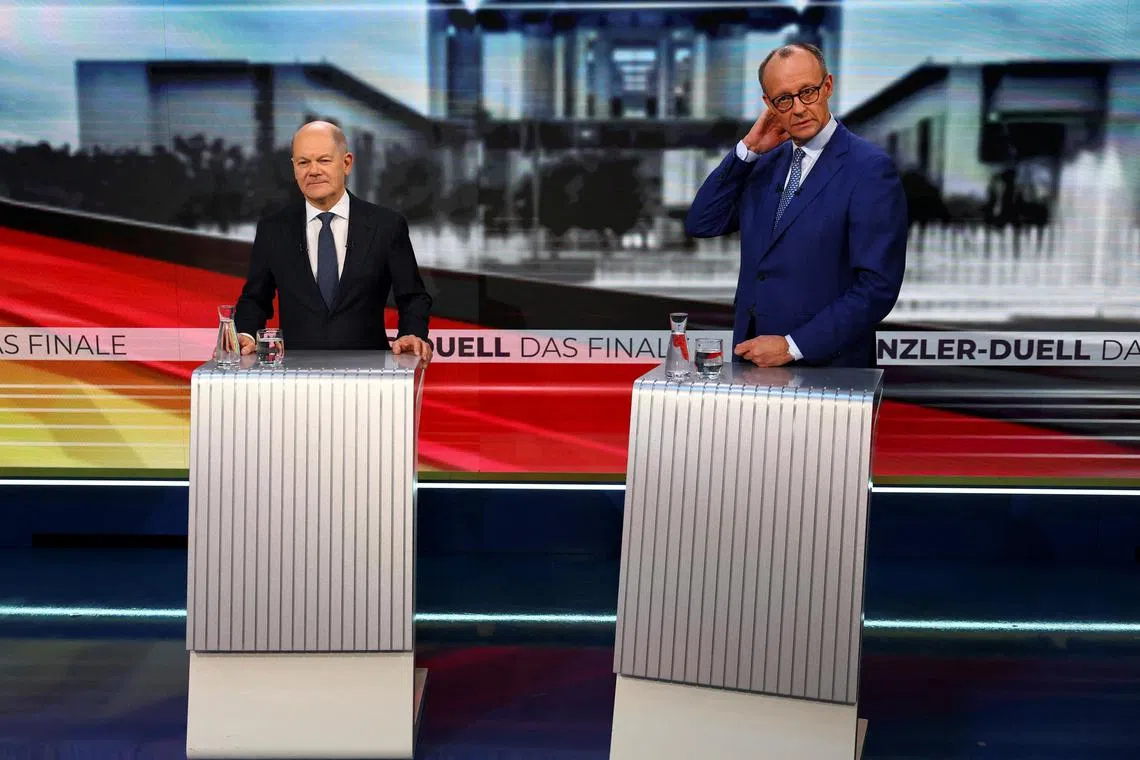Germany set for tricky coalition building, poll shows ahead of election
Sign up now: Get ST's newsletters delivered to your inbox

German Chancellor Olaf Scholz (left) and his conservative rival Friedrich Merz taking part in a TV debate in Berlin on Feb 19, ahead of Germany's Feb 23 election.
PHOTO: REUTERS
BERLIN – Germany’s mainstream political parties lost support while the far-right Alternative for Germany (AfD) gained ground in one of the last polls published before the election on Feb 23, pointing to likely tricky coalition building that could drag on for months.
The vote comes at an awkward moment, leaving a leadership vacuum at the heart of Europe just as it seeks to tackle a confrontational US President Donald Trump whose apparent desire to disengage from the region and mend ties with Russia raises questions about the solidity of the Western alliance.
The conservative Christian Democratic Union/Christian Social Union bloc of Mr Friedrich Merz, which has consistently led polls for months, dropped 1 percentage point to 29 per cent in the survey by Forsa, while the AfD gained 1 percentage point to 21 per cent.
Chancellor Olaf Scholz’s Social Democratic Party (SPD) dropped 1 percentage point to 15 per cent, while the Greens and the pro-market Free Democratic Party (FDP) were steady on 13 per cent and 5 per cent, respectively. The far-left Left party inched up 1 percentage point to 8 per cent.
With all parties refusing to work with the AfD in a country scarred by its Nazi past, the latest poll suggests it will be near impossible for any two of the other parties to form a majority.
Instead, front runner Merz will likely have to form a three-way coalition with either the SPD and Greens or SPD and FDP, according to the poll, making negotiations all the trickier.
Coalition talks could therefore take longer, leaving Mr Scholz in a caretaker role but unable to take major decisions on the future of Europe’s largest economy.
It also suggests the next coalition might be as incohesive and difficult to govern as the three-way alliance led by Mr Scholz that collapsed last November after just three years in power
Mr Scholz’s was the first such three-way coalition in decades at a national level – but such coalitions are set to become more frequent, given the rise of the AfD and the decline of the erstwhile big-tent parties.
Still, the tone of the campaign has softened in the past week in a sign that parties are preparing the path for talks.
Asked in a television debate if he would get into the boat of keen oarsman Scholz, Mr Merz replied “Ja (yes)”. Likewise, Mr Scholz affirmed that he would take a plane with hobby pilot Merz. “I assume he was given his pilot permit for a reason.”
The moment of camaraderie belied the tensions that had erupted between the leaders in recent weeks over migration policy, however, and, in particular, Mr Merz’s decision to attempt to push through a crackdown on migration with support from the AfD.
Mr Merz had previously vowed not to rely on AfD lawmakers to get measures through Parliament. Mr Scholz and others said they could no longer trust him after his turnaround. REUTERS


